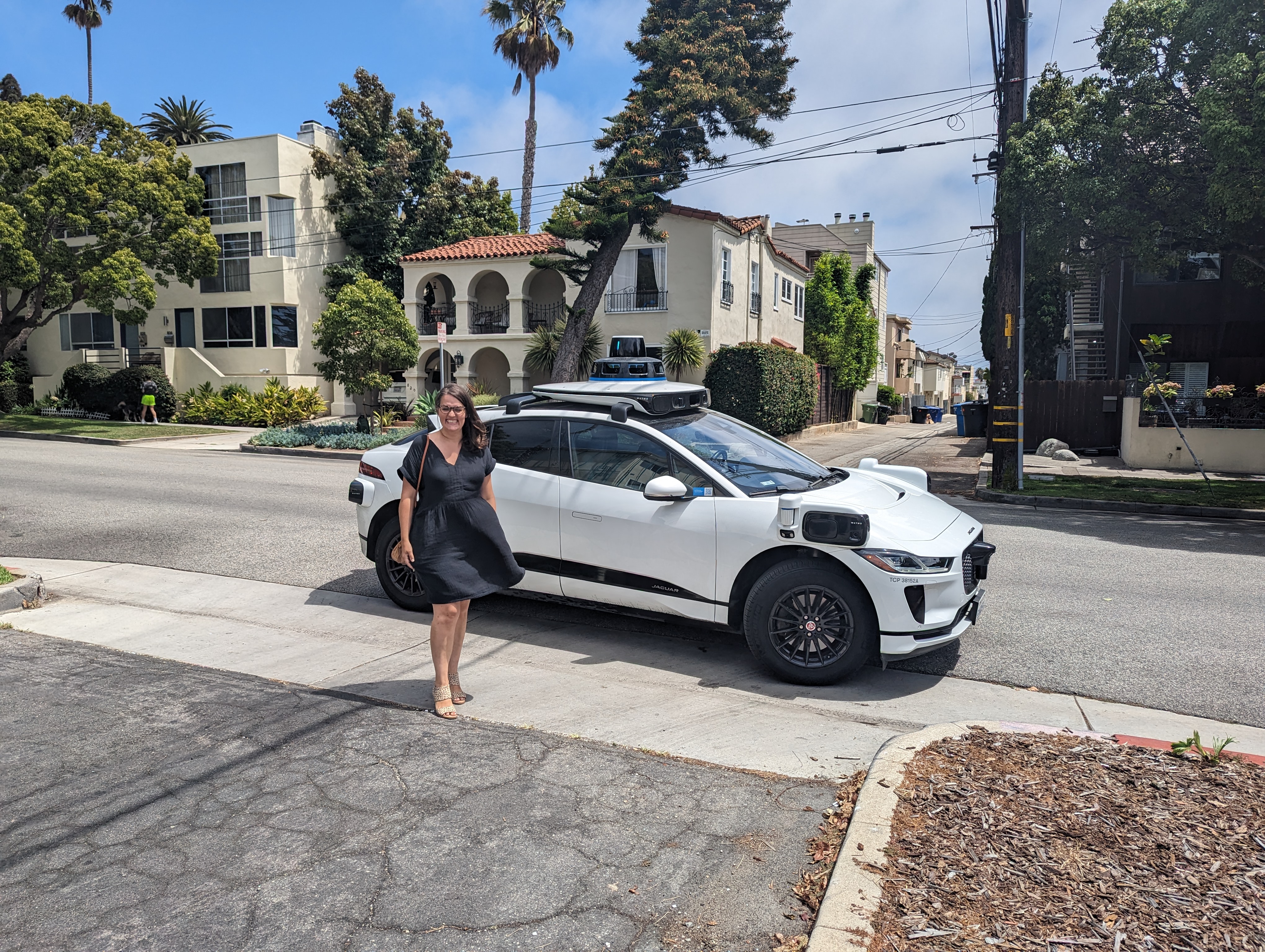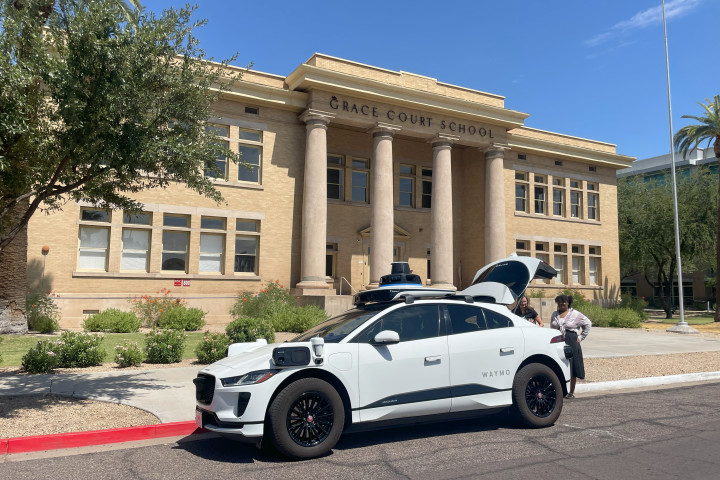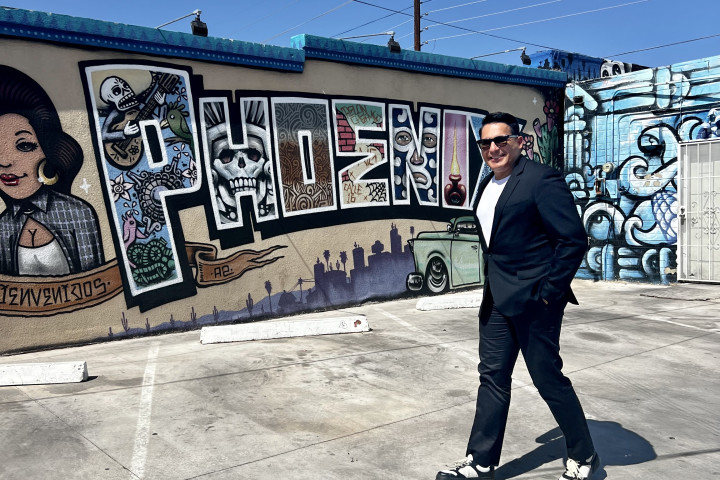LA Advocates for Women Say Waymo Could Offer a Safe, Reliable Transportation Option
March 26, 2024

Sarah Wilson, executive director of Harvest Home, standing by a Waymo One autonomous vehicle in Santa Monica
Single mothers in Los Angeles often juggle responsibilities and errands that span the city, yet getting from point A to point B can sometimes be a challenge.
Leaders of nonprofits that provide social services and support to women believe Waymo’s technology could offer a safe, reliable transportation option for people in Los Angeles who are experiencing homelessness or are single, working mothers.
Tisha Janigian, president and founder of the nonprofit She Is Hope LA, and Sarah Wilson, executive director of the Harvest Home, experienced Waymo’s fully autonomous ride-hailing service Waymo One first-hand.
“I think it would be beneficial for them to get to the different jobs that they have, taking their kids to school, to their activities,” Janigian shares, adding that many women she serves face challenges accessing safe, reliable transportation.
Janigian started She is Hope LA, a nonprofit dedicated to supporting single, working mothers, after becoming a single, working mother herself in 2012. She is Hope LA has provided direct assistance to over 800 women.
“Transportation is one of the main things someone needs in place for stability and I think often folks think about that as owning a vehicle, but the reality is that it can be cost prohibitive,” says Wilson, whose nonprofit serves mothers and expectant-mothers experiencing homelessness.
Transportation is one of the main things someone needs in place for stability and I think often folks think about that as owning a vehicle, but the reality is that it can be cost prohibitive.
Harvest Home is a 38-year-old organization providing housing, support, and programs that equip mothers to exit homelessness. With two locations in LA, Harvest Home has capacity to house up to 27 women at a time and up to 70 women a year.
Wilson emphasizes that aside from the challenges of owning a vehicle, other modes of transportation may feel unsafe to women who have experienced trauma.
“It feels really vulnerable to be in a space where you're one-on-one with someone, where if someone's bothering you or you feel unsafe and you don't have a quick exit strategy,” Wilson adds.
In cities it serves, Waymo One operates a service in which a completely empty vehicle takes passengers where they need to go 24/7.
“Besides going the speed limit, besides paying attention to what's going on on the road, there's just less fear factor [with Waymo],” says Janigian. “I want my moms and their kids to feel safe and this would be something that'll benefit all of them greatly.”
Besides going the speed limit, besides paying attention to what's going on on the road, there's just less fear factor [with Waymo]. I want my moms and their kids to feel safe and this would be something that'll benefit all of them greatly.
Waymo’s technology is designed to obey road rules like speed limits, remain constantly vigilant, and drive conscientiously and defensively with the safety of passengers and all other road users in mind.
Wilson emphasizes that safe, reliable, trustworthy modes of transportation are important for women to be able to obtain and maintain a job.
“Knowing that you have reliable transportation where you feel that emotional safety as well as physical safety is removing a barrier to work,” Wilson says.
Janigian and Wilson took a ride in Waymo around Los Angeles to get a sense of how autonomous driving technology might one day support their nonprofits’ missions.
“It was very interesting to see how it responded to the pedestrians, the stop signs, like it picked up everything, I felt very safe and very comfortable,” Janigian recalls. “I see the safety factor being a big deal.”
Wilson says she was impressed by how Waymo responded to an unexpected change in the traffic pattern.
“There was a situation where somebody in front of us threw on their brakes and Waymo actually sensed that it was happening before we clued into it,” Wilson recalls, adding that she felt a sense of trust during her ride. “There was no time I felt like Waymo wouldn't know what to do if a situation arose.”
Wilson says she can envision how Waymo’s technology could support Harvest Home’s mission, such as by helping transfer residents between homes for special events or housing transitions. She says she is grateful for the chance to experience autonomous driving technology before it becomes available to the public.
“I was impressed by how Waymo has been intentional about looking at how Waymo could be a service to the community even before they launched,” Wilson shares.
I was impressed by how Waymo has been intentional about looking at how Waymo could be a service to the community even before they launched.
Janigian says Waymo’s technology could help make the streets safer for everyone, no matter which mode of transportation they choose.
“If we were to get more of these kinds of cars on the road, I think it'll make it safer across the board: fewer crashes, less motorcycle crashes, fewer pedestrian fatalities. it's a really big deal.”
Sign Up
Join us in the most important conversations about how autonomous driving technology may shape the future of safety, mobility, community, and society.


